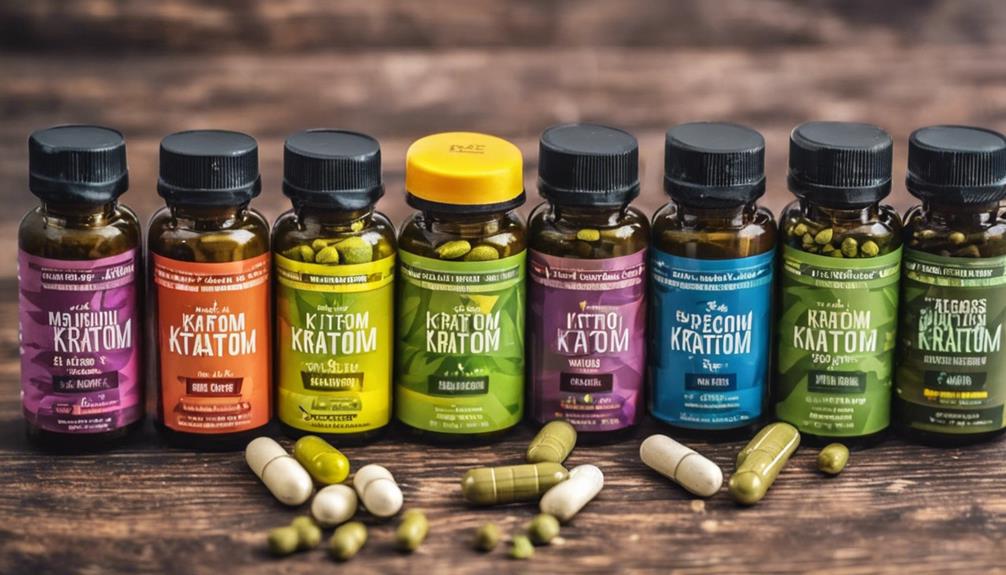Deprecated: mb_convert_encoding(): Handling HTML entities via mbstring is deprecated; use htmlspecialchars, htmlentities, or mb_encode_numericentity/mb_decode_numericentity instead in /home/users/kratomfiles/www/kratomfiles.com/wp-content/plugins/quick-adsense-reloaded/includes/template-functions.php on line 3552
Kratom (Mitragyna speciosa) is a tropical evergreen tree belonging to the coffee family, native to Southeast Asia. Its leaves have been utilized in traditional medicine for centuries to manage pain, increase energy, and reduce anxiety. In recent years, kratom has gained popularity in the United States as an alternative to prescription opioids for chronic pain management and alleviating opioid withdrawal symptoms.
It is available in various forms, including powder, capsules, and extracts, and can be consumed as a tea or ingested directly. The primary active compounds in kratom are alkaloids, with mitragynine and 7-hydroxymitragynine being the most prominent. These alkaloids interact with opioid receptors in the brain, producing analgesic effects and a sense of euphoria.
At lower doses, kratom also exhibits stimulating properties, making it a potentially versatile botanical with applications for various health conditions. Despite its traditional use and reported benefits, kratom remains controversial due to safety concerns and potential for abuse. Consequently, its legal status varies across different states, including Minnesota.
Key Takeaways
- Kratom is a tropical tree native to Southeast Asia, known for its medicinal properties and use as a natural remedy for pain relief and anxiety.
- Kratom is currently legal in Minnesota, but there have been efforts to ban or regulate its use in the state.
- In 2019, a bill was introduced in the Minnesota legislature to make kratom a Schedule I controlled substance, but it did not pass.
- While some people believe kratom has potential health benefits, others are concerned about its addictive properties and potential for abuse.
- Advocates for kratom in Minnesota are working to educate the public and lawmakers about its potential benefits and to prevent any future bans or restrictions on its use.
Current Legal Status of Kratom in Minnesota
Classification and Regulation
The Minnesota Board of Pharmacy has classified kratom as an “herbal product,” which means it is not regulated as a controlled substance or approved for medicinal use. This classification allows for the sale and distribution of kratom without the need for a prescription or oversight by healthcare professionals.
Efforts to Regulate or Ban Kratom
Despite its legal status, there have been efforts to regulate or ban kratom in Minnesota. In 2019, the Minnesota Board of Pharmacy proposed adding kratom to the state’s list of controlled substances, citing concerns about its potential for abuse and dependence.
Ongoing Debate and Need for Further Research
However, after receiving public feedback and conducting a review of the available scientific evidence, the board ultimately decided not to pursue scheduling kratom as a controlled substance. This decision reflects the ongoing debate surrounding the regulation of kratom and the need for further research into its potential benefits and risks.
History of Kratom Legislation in Minnesota

The history of kratom legislation in Minnesota is marked by several attempts to regulate or ban the substance, as well as advocacy efforts to protect access to kratom for consumers. In 2018, a bill was introduced in the Minnesota House of Representatives that sought to make kratom a Schedule I controlled substance, effectively banning its sale and possession in the state. The bill was met with opposition from advocates who argued that kratom has legitimate uses and should not be criminalized without further scientific study.
Following public outcry and testimony from individuals who use kratom for managing chronic pain and other health conditions, the proposed ban was ultimately dropped, and the issue was referred to the Board of Pharmacy for further review. In 2019, the Board of Pharmacy conducted a comprehensive assessment of kratom, including a review of scientific literature and public comments. After considering all available evidence, the board decided not to pursue scheduling kratom as a controlled substance, allowing it to remain legal for sale and use in Minnesota.
The decision by the Board of Pharmacy to maintain the legal status of kratom reflects a balanced approach to addressing public health concerns while preserving access to alternative treatments for individuals who rely on kratom for managing their health. However, the ongoing debate surrounding kratom legislation in Minnesota highlights the need for continued research and education about this botanical substance.
Potential Health Benefits and Risks of Kratom
| Health Benefits of Kratom | Health Risks of Kratom |
|---|---|
| Relief from pain | Dependency and addiction |
| Improved mood and relaxation | Increased heart rate |
| Increased energy and focus | Constipation |
| Reduced anxiety and stress | Nausea and vomiting |
Kratom has been touted for its potential health benefits, including pain relief, mood enhancement, and increased energy. Many individuals use kratom as an alternative to prescription opioids for managing chronic pain, as well as for alleviating symptoms of anxiety and depression. Some proponents also claim that kratom can help with opioid withdrawal symptoms and reduce cravings for addictive substances.
However, the scientific evidence supporting these claims is limited, and more research is needed to fully understand the therapeutic effects of kratom. On the other hand, there are also potential risks associated with kratom use. The U.S.
Food and Drug Administration (FDA) has raised concerns about the safety of kratom, citing reports of adverse effects such as seizures, liver damage, and even death associated with its consumption. Additionally, there have been cases of individuals developing dependence on kratom and experiencing withdrawal symptoms when attempting to stop using it. These risks underscore the need for caution when using kratom and highlight the importance of informed decision-making regarding its potential benefits and drawbacks.
Overall, while some individuals may experience positive effects from using kratom, it is essential to approach its consumption with care and awareness of potential risks. More research is necessary to determine the safety and efficacy of kratom for various health conditions, and individuals considering its use should consult with healthcare professionals to make informed choices about their treatment options.
Public Opinion and Advocacy for Kratom in Minnesota
Public opinion on kratom in Minnesota is divided, with advocates highlighting its potential benefits and opponents expressing concerns about its safety and abuse potential. Advocacy groups such as the American Kratom Association (AKA) have been active in promoting access to kratom for consumers while advocating for responsible regulation to ensure product quality and safety standards. These organizations have worked to educate policymakers and the public about the potential uses of kratom as well as to address misconceptions and misinformation surrounding its effects.
On the other hand, some healthcare professionals and public health officials have raised alarms about the lack of regulation and oversight of kratom products, emphasizing the need for more stringent controls to protect consumers from potential harm. The FDA has issued warnings about contaminated and adulterated kratom products being sold in the market, underscoring the importance of quality assurance measures to safeguard public health. The ongoing dialogue between advocates, policymakers, and public health stakeholders reflects the complex nature of kratom regulation in Minnesota.
While there is support for maintaining access to kratom for individuals who benefit from its use, there are also valid concerns about ensuring consumer safety and preventing misuse. Moving forward, continued engagement and collaboration among all stakeholders will be crucial in shaping policies that strike a balance between promoting public health and preserving access to alternative treatments like kratom.
Enforcement and Penalties for Kratom-related Offenses in Minnesota

Age Restrictions and Product Quality
In Minnesota, the primary focus of kratom law enforcement is on ensuring that retailers comply with age restrictions for purchase and preventing the sale of adulterated or contaminated products. Individuals over 18 years old are legally allowed to possess and use kratom, but selling or distributing kratom products to minors or selling subpar products can result in penalties. Retailers who violate these regulations may face fines or other penalties for non-compliance with state laws governing herbal products like kratom.
Product Safety Standards
To address concerns about adulterated or contaminated kratom products, the Minnesota Department of Agriculture oversees product safety standards and takes enforcement actions against vendors found selling unsafe or mislabeled kratom products.
Enforcement Efforts
The enforcement efforts related to kratom in Minnesota aim to protect consumers from potential harm while ensuring that retailers adhere to legal requirements for selling herbal products. By upholding these standards, authorities seek to promote public safety and maintain consumer confidence in the quality and integrity of kratom products available in the state.
Future Outlook for Kratom Legislation in Minnesota
The future outlook for kratom legislation in Minnesota is likely to be shaped by ongoing research into its potential benefits and risks, as well as continued advocacy efforts from stakeholders on all sides of the issue. As more scientific evidence becomes available, policymakers may revisit the classification of kratom as an herbal product and consider additional regulations to address concerns about its safety and abuse potential. At the same time, advocacy groups will continue to work towards protecting access to kratom for individuals who rely on it for managing their health conditions while advocating for responsible regulation that ensures product quality and consumer safety.
By engaging in constructive dialogue with policymakers and public health officials, these organizations aim to shape policies that strike a balance between promoting public health and preserving access to alternative treatments like kratom. Ultimately, the future outlook for kratom legislation in Minnesota will depend on collaborative efforts among all stakeholders to address legitimate concerns while recognizing the potential benefits that kratom may offer to individuals seeking alternative options for managing their health. By fostering an environment of open communication and evidence-based decision-making, Minnesota can develop policies that reflect a nuanced understanding of kratom’s effects and promote responsible use within the state.
If you’re wondering about the legal status of kratom in Minnesota, you may also be interested in learning about the potential risks and side effects of consuming kratom tea. A recent article on kratom tea liver risks, side effects, and toxicity explores the potential dangers associated with this popular method of consuming kratom. Understanding the potential health risks of kratom is important for anyone considering using this substance, especially in states where its legal status may be in question.
FAQs
What is kratom?
Kratom is a tropical tree native to Southeast Asia, known for its leaves which have been used for centuries for their medicinal and recreational properties.
Is kratom legal in Minnesota?
As of 2021, kratom is legal to buy, sell, and possess in the state of Minnesota. There are no current restrictions or regulations on the use of kratom in the state.
Is kratom regulated in Minnesota?
Kratom is not currently regulated by the state of Minnesota. However, it is important to note that the legal status of kratom can change, so it is always best to check for the most up-to-date information.
Where can I buy kratom in Minnesota?
Kratom can be purchased from various online vendors as well as from some local smoke shops and specialty stores in Minnesota.
Is it safe to use kratom in Minnesota?
While kratom is legal in Minnesota, it is important to use it responsibly and in moderation. It is also advisable to consult with a healthcare professional before using kratom, especially if you have any pre-existing medical conditions or are taking other medications.










